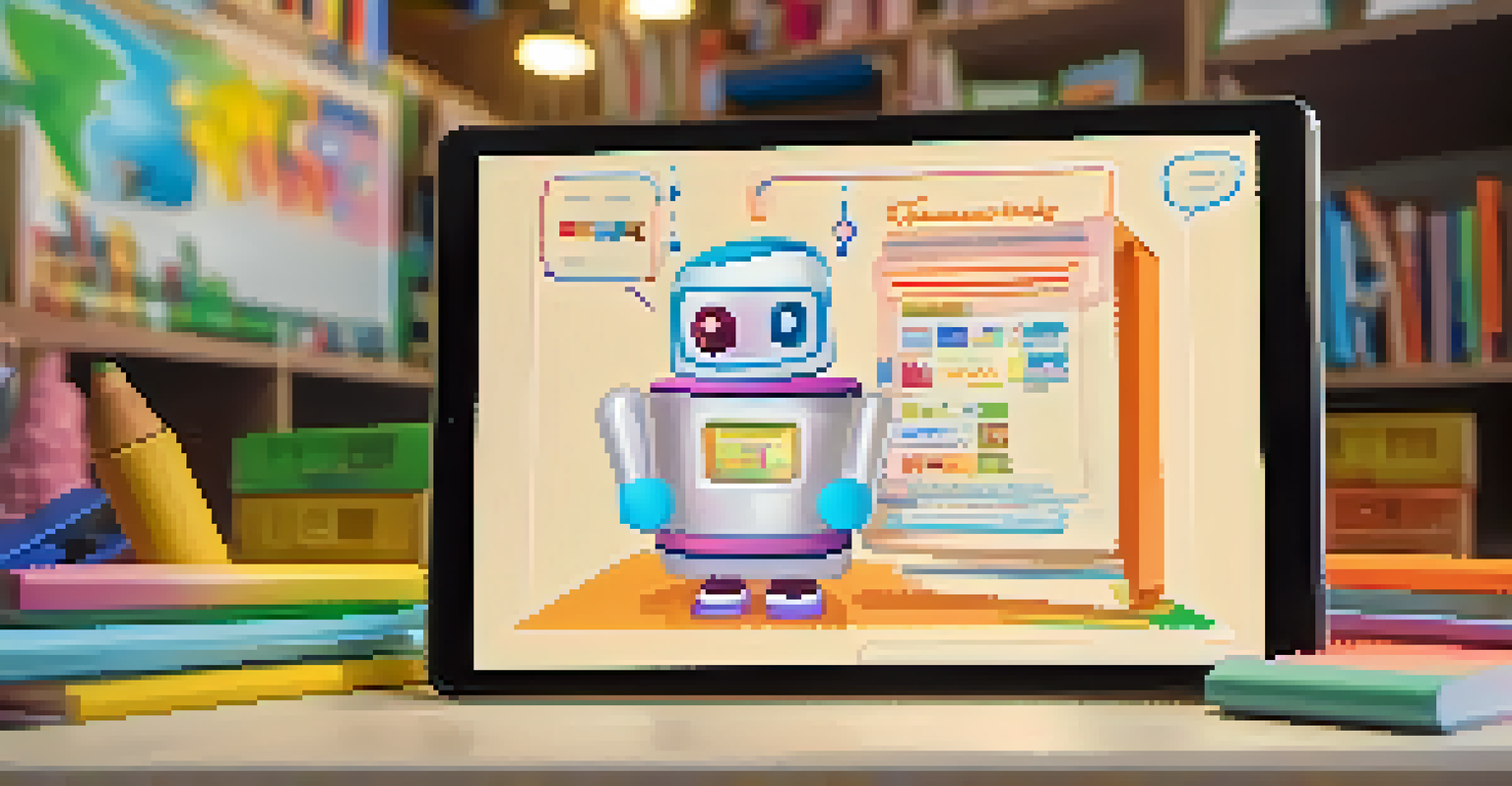AI Innovations in Early Childhood Education and Development

The Role of AI in Early Learning Environments
Artificial Intelligence (AI) is becoming a game-changer in early childhood education. By integrating AI technologies, educators can create personalized learning experiences that cater to the unique needs of each child. This means that learning can be more engaging and effective, as it adapts to the child's pace and interests.
The greatest gift you can give your child is a strong foundation for learning.
For instance, AI-powered educational apps can assess a child's skills and recommend activities that enhance learning. This individualized approach not only boosts children's confidence but also fosters a love for learning from a young age. It’s like having a personal tutor available 24/7, making education more accessible and enjoyable.
Furthermore, AI can help educators track developmental milestones and identify any areas where a child might need extra support. This data-driven approach enables timely interventions that can significantly improve a child's educational journey.
Enhancing Interaction with AI-Powered Tools
One of the most exciting developments in early childhood education is the use of AI-powered interactive tools. These tools can engage young learners through games, stories, and activities that are not only fun but also educational. Think of it as an interactive playground where kids can explore and learn simultaneously.

For example, AI chatbots can converse with children, helping them develop language skills in a playful manner. This interaction can spark curiosity and make learning feel less like a chore and more like an adventure. By using familiar platforms, children feel comfortable and excited to learn.
AI Personalizes Early Learning
AI technologies create tailored educational experiences that adapt to each child's unique pace and interests.
Moreover, these tools can provide instant feedback, allowing children to learn from their mistakes in real-time. This immediate reinforcement helps solidify concepts and encourages a growth mindset, where children learn to embrace challenges rather than shy away from them.
Fostering Social Skills through AI
AI doesn't just enhance academic learning; it also plays a vital role in developing social skills among young children. Through AI-driven collaborative games and activities, children learn to work together, share, and communicate effectively. These interactions lay the groundwork for strong social competencies that will serve them throughout life.
Technology is best when it brings people together.
For instance, virtual reality (VR) experiences powered by AI can simulate social scenarios, allowing children to practice their interaction skills in a safe environment. This exposure helps them navigate real-world situations with more confidence and empathy. It's like role-playing without the pressure, making social learning feel natural and enjoyable.
Additionally, AI can provide insights into children's emotions and behaviors, helping educators tailor their approaches to meet social learning needs. This personalized attention ensures that every child has the opportunity to thrive socially and emotionally.
Supporting Diverse Learning Needs with AI
AI is particularly beneficial in addressing the diverse learning needs of children in early education. With tools that can analyze individual learning styles and preferences, educators can better support children with varying abilities. This ensures that every child has equal access to quality education, regardless of their background or challenges.
For example, AI can adjust the difficulty level of tasks based on a child's performance, providing additional support or challenges as needed. This adaptability helps keep children engaged and motivated, reducing frustration and increasing their desire to learn. It's akin to having a tailored education plan that evolves with each child's journey.
AI Enhances Social Skill Development
Through collaborative games and virtual scenarios, AI helps children develop essential communication and teamwork skills.
Moreover, AI can assist educators in identifying learning disabilities early on, allowing for timely interventions. This proactive approach can significantly impact a child's educational trajectory, ensuring they receive the support they need to succeed.
AI-Driven Assessment and Progress Tracking
Another significant advantage of AI in early childhood education is its ability to streamline assessment and progress tracking. Traditional assessment methods can be time-consuming, but AI can automate these processes, providing educators with instant insights into a child's development. This efficiency allows teachers to focus more on teaching and less on paperwork.
AI tools can evaluate a child's performance across various subjects, highlighting strengths and areas for improvement. This data not only aids in personalized learning but also helps inform parents about their child's progress, fostering a strong home-school connection.
Additionally, continuous assessment through AI can help educators adjust their teaching strategies in real-time. This flexibility ensures that the educational experience remains relevant and effective, ultimately benefiting the child's learning journey.
Ethical Considerations in AI for Education
While the benefits of AI in early childhood education are clear, it's essential to consider the ethical implications. As with any technology, there are concerns regarding data privacy, especially when it comes to young children. Educators and developers must prioritize the safety and security of children's information to build trust in these new tools.
Moreover, there is a responsibility to ensure that AI does not replace human interaction but instead enhances it. The role of teachers in early education is irreplaceable; technology should be viewed as an aid rather than a substitute. Balance is key to creating an enriching educational environment.
AI Streamlines Assessment Processes
AI automates assessment and progress tracking, allowing educators to focus on teaching while providing instant insights into a child's development.
Finally, ongoing discussions about the equitable access to AI resources are crucial. Ensuring that all children, regardless of socioeconomic status, can benefit from these innovations is vital for fostering an inclusive educational landscape.
Future of AI in Early Childhood Education
The future of AI in early childhood education looks promising, with numerous innovations on the horizon. As technology continues to evolve, we can expect even more sophisticated tools that will further enhance learning experiences. This evolution could lead to more immersive educational environments that captivate children's imaginations.
One potential development is the integration of AI with augmented reality (AR), allowing children to explore interactive, 3D learning experiences. Imagine a classroom where children can walk through historical events or dive into the ocean to learn about marine life—all facilitated by AI.

As we move forward, it’s crucial to keep an open dialogue about the role of AI in education. By collaborating with educators, parents, and technology developers, we can ensure that these innovations are harnessed effectively to benefit young learners.